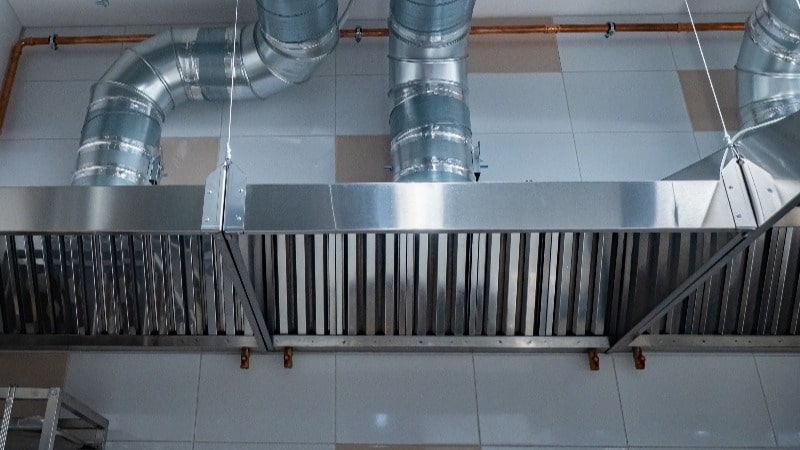4 Things You Need To Know About Kitchen Hood Maintenance
by Stephen Cieslukowski, President | Dec 13, 2024 | Fire System, Fire Suppression | 4 comments

Much can go wrong in a commercial-grade kitchen where grease, smoke, and flame are “tools of the trade.”
Kitchen fires are one of the most destructive and costly problems a restaurant, hotel, or any business can experience. More often than not, a kitchen fire is made worse by non-compliant or non-maintained kitchen hood suppression systems. And the data proves it.
According to the National Restaurant Association, from 2017-2021 the US Fire Department received reports of more than 9,000 structure fires in eating and drinking establishments each year. These fires caused more than 100 civilian injuries, and $175 million in direct property damage yearly.
The financial bottom line: $165 million in direct property damage each year. That doesn’t even include downtime making repairs to the kitchen hood and restaurant. Could your restaurant and your employees survive if it had to shut down for an extended period of time? Keeping your kitchen hoods properly cleaned, serviced, and inspected helps prevent devastating fires and costly downtime.
COMMERCIAL KITCHEN VIGILANCE
It’s not just kitchens in restaurants that are literal hot spots. Senior living communities, schools, hotels—any business that has a commercial kitchen system must make sure their kitchen hoods are in proper working order. They need to be cleaned and maintained for safety and compliance.
You’ll want to protect your customers and employees by hiring a licensed kitchen hood company to keep these systems properly maintained and code compliant. Stay compliant with inspections, because insurance claims are expensive. Plus, dirty and potentially dangerous hoods can hurt your business and reputation.
TOURIST ATTRACTION RECONFIG
Here’s a story that demonstrates kitchen vigilance: A well-known metro area tourist lodge needed to align with kitchen safety and compliance regulations during their remodeling/rebranding. The lodge had four separate kitchen systems in multiple areas and different kitchen hood systems ( dry chemical and Piranha).
While rebranding and remodeling, the fire marshal instructed them to reconfigure the systems–mere days before theirr Grand Re-opening.
The lodge called on Brothers Fire & Security to help them meet a tight deadline. Within days, we helped them make the changes and requirements, and the Grand Re-Opening went on as scheduled.
4 TIPS ABOUT CLEANING KITCHEN HOODS
- Dirty kitchen hoods don’t clean themselves. When commercial kitchen equipment catches fire, it can lead to hood and ductwork fires, which quickly spread out of control if they are dirty or not operating properly.
- Keep nozzles and links clean from grease to avoid clogging. Best practices dictate that these parts should be changed every six months–or even sooner. Clogged nozzles and links can delay or prevent proper activation..
- Dirty kitchen hoods may affect your insurance coverage. If an insurer determines that you didn’t maintain proper maintenance of the hood, they might reject your claim, leaving you liable for the damages. State Codes, NFPA, and most insurance companies require bi-annual inspections. Failure to do so is a violation of the NFPA code, and you could be red-tagged, which can shut down the kitchen and cooking systems.
- Schedule kitchen hood inspections twice a year and add them to your staff calendar. It’s also smart to schedule maintenance every 2-3 years, to make sure your kitchen hoods are in top performance. During inspections, make sure links are changed, nozzles are cleaned, the mechanical activation is intact, chemical tanks are full, and the system works properly.
For help tracking these maintenance efforts, download our Kitchen-Hood Inspection Checklist. If repairs are needed, Brothers Fire & Security can provide the necessary labor and materials to ensure NFPA 17A and NFPA 96 compliance.
We help meet the needs of our clients at any time: emergency weekend jobs, short notice projects, material procurement, implementation, testing , and obtaining city approval—all done on time and on budget. That’s our commitment: We’ll get you in compliance and keep you compliant!
Recent Posts
- Ultimate Guide to Fire Extinguishers: Testing, Inspections, Maintenance
- Ensuring Fire Alarm Speech Intelligibility
- Get Control of Your Fire & Security Systems with the BFS Planning Matrix
- Understanding NFPA Standards: The Key to Comprehensive Fire Protection
- 4 Things You Need To Know About Kitchen Hood Maintenance
